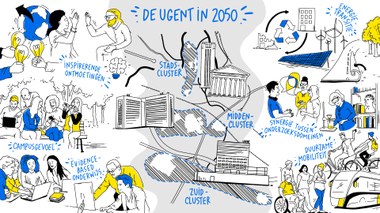Future plan for campuses in Ghent by 2050
Ghent University redesigns the university campuses in an ambitious future plan: a long-term vision in which the 11 faculties will be housed in three clusters by 2050.
The 3 university clusters would be on one virtual axis from the centre of the city of Ghent across Campus Sterre and UZ Gent to the south of Ghent by 2050. Some traditional university campuses will be abandoned.
With the long-term vision, Ghent University wants to rethink the infrastructure in function of the challenges that will arise in the coming decades. In concrete terms, four faculties (or in some cases: a specific part of a faculty) will each be grouped by cluster.
Rector Rik Van de Walle: "We want to transform those 3 zones into clear campuses, where buildings are connected in a meaningful way, where there are plenty of green areas, where students and staff can think, learn, and collaborate in a sustainable way. Where students can live. Where functions are connected: taking classes, doing research, working and collaborating."
The implementation of this vision will be accompanied by ongoing consultations at both local and supra-local levels in the coming years. After all, the necessary permits to implement this plan are crucial and numerous. To this end, Ghent University will start consultations with both the local and Flemish authorities in the short term.
From about 20 scattered campuses to 3 university clusters
- The city cluster is located in the centre of Ghent with the faculties of Law and Criminology, Political and Social Sciences, Arts and Philosophy and the Department of Architecture and Urban Planning.
- The middle cluster is located around Campus Sterre and UZ Gent with the faculties of Sciences, Medicine and Health Sciences, Pharmaceutical Sciences and Psychology and Educational Sciences.
- The south cluster extends in the south of the city from Campus Ardoyen in Zwijnaarde with the faculties of Engineering and Architecture, Economics and Business Administration, Bioscience Engineering to the Faculty of Veterinary Medicine in Campus Merelbeke. Read more about the future plans for Campus Ardoyen.
This means that Campus Coupure (Faculty of Bioscience Engineering), Campus Dunant (Faculty of Psychology and Educational Sciences), Campus Schoonmeersen (the Ghent University activities), Campus Heide (part of Faculty of Veterinary Medicine), Campus Mercator (part of Faculty of Arts and Philosophy) and Campus Rommelaere (currently no occupancy) will be vacated by 2050.
The research and teaching activities taking place on these campuses or in these buildings will be relocated. Buildings that are abandoned may be given in concession or long lease to an external party, or sold.
Towards a sustainable university with more shared facilities
With the long-term vision, the university outlines the choices to be made now and in the near future. Education, research and service provision are central to Ghent University's core tasks. Sustainability, mobility and digitisation are also major challenges and opportunities. The plan allows for an optimal response to these. Among other things, Ghent University is focusing on shared facilities within the core campuses in order to achieve a high-quality, sustainable and compact university.
Rector Rik Van de Walle: "Collaboration between researchers with different backgrounds and diverse expertise leads to research at the cutting edge. The model of the three clusters, with open buildings and space for chance encounters, should facilitate that kind of research. We want to achieve even more shared research infrastructure and even more synergy between research areas."
From now on, this vision will be central to every decision concerning Ghent University's patrimony. Every building project or renovation plan will be tested against it.
